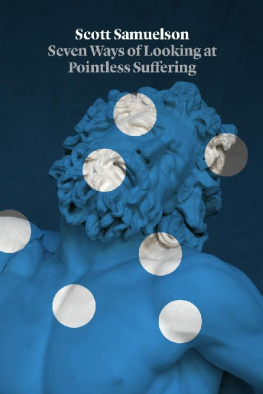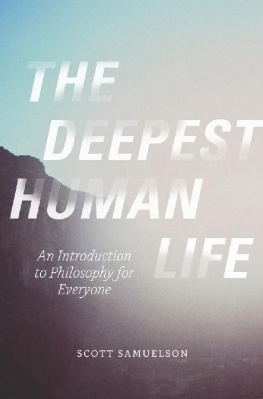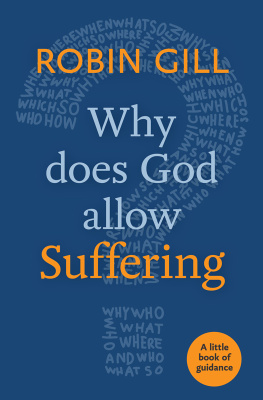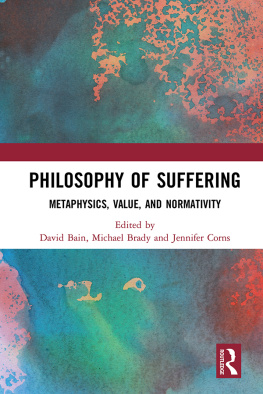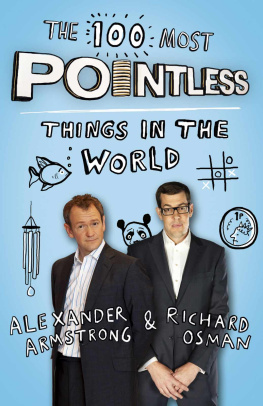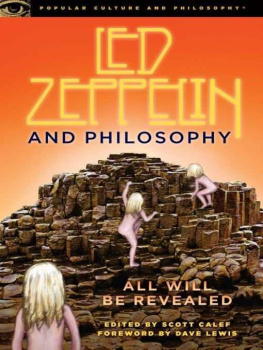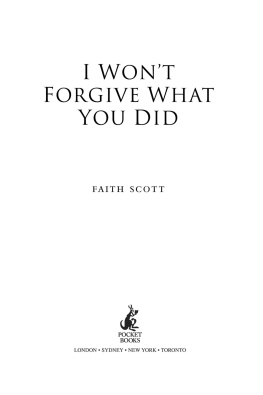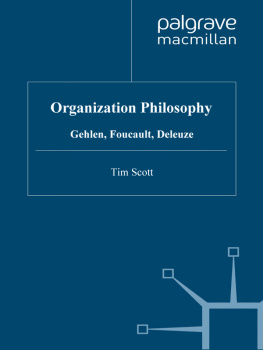Scott Samuelson - Seven Ways of Looking at Pointless Suffering: What Philosophy Can Tell Us about the Hardest Mystery of All
Here you can read online Scott Samuelson - Seven Ways of Looking at Pointless Suffering: What Philosophy Can Tell Us about the Hardest Mystery of All full text of the book (entire story) in english for free. Download pdf and epub, get meaning, cover and reviews about this ebook. year: 2018, publisher: University of Chicago Press, genre: Religion. Description of the work, (preface) as well as reviews are available. Best literature library LitArk.com created for fans of good reading and offers a wide selection of genres:
Romance novel
Science fiction
Adventure
Detective
Science
History
Home and family
Prose
Art
Politics
Computer
Non-fiction
Religion
Business
Children
Humor
Choose a favorite category and find really read worthwhile books. Enjoy immersion in the world of imagination, feel the emotions of the characters or learn something new for yourself, make an fascinating discovery.
- Book:Seven Ways of Looking at Pointless Suffering: What Philosophy Can Tell Us about the Hardest Mystery of All
- Author:
- Publisher:University of Chicago Press
- Genre:
- Year:2018
- Rating:5 / 5
- Favourites:Add to favourites
- Your mark:
- 100
- 1
- 2
- 3
- 4
- 5
Seven Ways of Looking at Pointless Suffering: What Philosophy Can Tell Us about the Hardest Mystery of All: summary, description and annotation
We offer to read an annotation, description, summary or preface (depends on what the author of the book "Seven Ways of Looking at Pointless Suffering: What Philosophy Can Tell Us about the Hardest Mystery of All" wrote himself). If you haven't found the necessary information about the book — write in the comments, we will try to find it.
Scott Samuelson: author's other books
Who wrote Seven Ways of Looking at Pointless Suffering: What Philosophy Can Tell Us about the Hardest Mystery of All? Find out the surname, the name of the author of the book and a list of all author's works by series.
Seven Ways of Looking at Pointless Suffering: What Philosophy Can Tell Us about the Hardest Mystery of All — read online for free the complete book (whole text) full work
Below is the text of the book, divided by pages. System saving the place of the last page read, allows you to conveniently read the book "Seven Ways of Looking at Pointless Suffering: What Philosophy Can Tell Us about the Hardest Mystery of All" online for free, without having to search again every time where you left off. Put a bookmark, and you can go to the page where you finished reading at any time.
Font size:
Interval:
Bookmark:
SCOTT SAMUELSON
The University of Chicago Press
Chicago and London
The University of Chicago Press, Chicago 60637
The University of Chicago Press, Ltd., London
2018 by The University of Chicago
All rights reserved. No part of this book may be used or reproduced in any manner whatsoever without written permission, except in the case of brief quotations in critical articles and reviews. For more information, contact the University of Chicago Press, 1427 E. 60th St., Chicago, IL 60637.
Published 2018
Printed in the United States of America
27 26 25 24 23 22 21 20 19 18 1 2 3 4 5
ISBN-13: 978-0-226-40708-1 (cloth)
ISBN-13: 978-0-226-40711-1 (e-book)
DOI: https://doi.org/10.7208/chicago/9780226407111.001.0001
Library of Congress Cataloging-in-Publication Data
Names: Samuelson, Scott, author.
Title: Seven ways of looking at pointless suffering : what philosophy can tell us about the hardest mystery of all / Scott Samuelson.
Description: Chicago ; London : The University of Chicago Press, 2018. | Includes bibliographical references and index.
Identifiers: LCCN 2017038262 | ISBN 9780226407081 (cloth : alk. paper) | ISBN 9780226407111 (e-book)
Subjects: LCSH: Suffering. | Pain. | SufferingReligious aspects.
Classification: LCC BF789.S8 S265 2018 | DDC 204/.42dc23
LC record available at https://lccn.loc.gov/2017038262
 This paper meets the requirements of ANSI / NISO Z39.48-1992 (Permanence of Paper).
This paper meets the requirements of ANSI / NISO Z39.48-1992 (Permanence of Paper).
It began to seem that one would have to hold in the mind forever two ideas which seemed to be in opposition. The first idea was acceptance, the acceptance, totally without rancor, of life as it is, and men as they are: in the light of this idea, it goes without saying that injustice is a commonplace. But this did not mean that one could be complacent, for the second idea was of equal power: that one must never, in ones own life, accept these injustices as commonplace but must fight them with all ones strength. This fight begins, however, in the heart and it now had been laid to my charge to keep my own heart free of hatred and despair.
JAMES BALDWIN
Man from his vantage point can see Reality only in contradictions. And the more faithful he is to his perception of the contradiction, the more he is open to what there is for him to know.
ALFRED KAZIN
I think of my pal Matt Kaufman, a curly-blond fifth-grader, full of possibility and mischief, who was popping wheelies on the edge of town when a high-schooler came whizzing over the hill in a car. On impact Matts body vaulted through the air, landed on the nearby playground, and ballooned to what seemed like twice its original size. Since school had just been let out, a young audience witnessed the scene and waited beside his immobile bleeding body for the medevac. He died on the way to the hospital. I was in fourth grade at the time. My mom confirmed my friends death as I was playing anxiously on the stairs with my action figures. I felt the question Why? creep through my whole body. My toys fell and lay in awkward poses on the steps.
The suffering of children sharply illustrates the gap between how the world is and how we think it should be. You need the imaginative gymnastics of past lives or inherited sin to see anything remotely like justice in most of it. Just think: somewhere right now there are children cringing at the screams of their parents, children begging for food, children walking in fear to school, children coughing up blood, children being born with painful deformities, children dying. Somewhere right now another Matt Kaufman is writhing in pain. According to the National Center for Victims of Crime, one in five girls and one in twenty boys are the victims of sexual abuse: so its too painful to continue to imagine what children are going through somewhere right now.
Fleeing to the adult world isnt much help. Every minute some of us are being raped. Every minute some of us are dying before we had time to bring to fruition our potential. Every second, every fraction of a second, were enduring pains that we did not choose and that serve no apparent purpose: madness, injustice, loneliness, grief, terrorism, torture, tyranny, boredom, depression, humiliation, oppression, despair, unrequited love, andfor that matterrequited love. In The Anatomy of Melancholy Robert Burton observes,
I can show no state of life to give content. The like you may say of all ages: children live in a perpetual slavery, still under that tyrannical government of masters: young men, and of riper years, subject to labour, and a thousand cares of the world... the old are full of aches in their bones, cramps and convulsions, silicernia [a funeral feast], dull of hearing, weak-sighted, hoary, wrinkled, harsh, so much altered as that they cannot know their own face in a glass, a burden to themselves and others; after seventy years, all is sorrow (as David hath it), they do not live, but linger.
As Burtons four-century-old book reminds us, pointless suffering was hardly invented yesterday. Our ancestors, on top of the usual miseries, from which they were anything but immune, had to cope with such horrors as lynching, the plague, Hiroshima, the Thirty Years War, beheading, the Middle Passage, and Treblinka. They commonly suffered and died from polio, yellow fever, hookworm, malaria, measles, mumps, rubella, and smallpox. Has the eradication of these diseases, insofar as they have been eradicated, caused a corresponding loss of something right and good? In other words, would anyone of sound mind wish that we could reintroduce them more generally? What does that say about the world we live in?
What about animals? Arthur Schopenhauer observes, The pleasure in this world, it has been said, outweighs the pain.... If the reader wishes to see shortly whether this statement is true, let him compare the respective feelings of two animals, one of which is engaged in eating the other.
************
The etymological root of the word evil, according to the compilers of the Oxford English Dictionary, means primarily exceeding due measure or overstepping proper limits. Because suffering is how we register such overstepping, evil has traditionally been used to refer to anything that does harm. To pluck just two examples from the OEDs several pages of charming illustrations: Caxton in 1480 complains of the yelow euyll that is called the Jaundis, and in 1655 Culpepper warns, In a great Headach it is evil to have the outward parts cold.
As much as we lament jaundice and migraines, especially when our feet are cold, were a lot less likely nowadays to call them evil, at least not in earnest. For us, evil refers mostly to purposeful infliction of needless suffering. Evil is what Nazi-types do, and the Devil of our mythology is Hitler. An interesting transformation takes place in modernity, which well soon discuss, whereby the concept of evil is cordoned off from natural events and circumscribed to the sphere of human action. Jaundice and earthquakes are unfortunate, not evil. Nature just occurs. Shit happens, as we modernists say.
To return us to the more comprehensive idea of evil, one that encompasses human wrongdoing as well as death and misery, Ive chosen to use the phrase pointless suffering. I admit that the phrase is tricky, for this book is largely about how people have found a point in suffering: how artists have found in it the inspiration for our essential works of art, how spiritual seekers have found in it a road to God, how philosophers have found in it atonement with nature and training for our fundamental virtues. But I think the phrase pointless suffering works for two reasons.
Font size:
Interval:
Bookmark:
Similar books «Seven Ways of Looking at Pointless Suffering: What Philosophy Can Tell Us about the Hardest Mystery of All»
Look at similar books to Seven Ways of Looking at Pointless Suffering: What Philosophy Can Tell Us about the Hardest Mystery of All. We have selected literature similar in name and meaning in the hope of providing readers with more options to find new, interesting, not yet read works.
Discussion, reviews of the book Seven Ways of Looking at Pointless Suffering: What Philosophy Can Tell Us about the Hardest Mystery of All and just readers' own opinions. Leave your comments, write what you think about the work, its meaning or the main characters. Specify what exactly you liked and what you didn't like, and why you think so.

